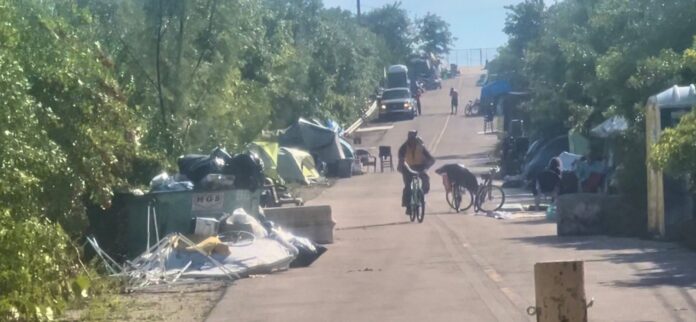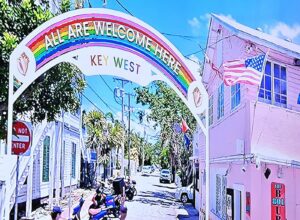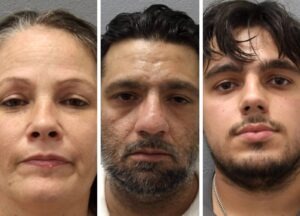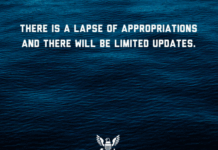
Three months after the effective date of a new law that essentially banned homeless camping throughout Florida, dozens of Marathon residents are preparing to exercise their newly-bestowed right to sue the city over a heavily-scrutinzied homeless encampment on 20th Street.
Filed on Jan. 15 with the Monroe County Clerk of Court, the 55-page complaint and request for injunctive relief is signed by nearly 40 Marathon residents and businesses, headlined by commercial captain Morgan Gotti. The vast majority of the signed plaintiffs list addresses on 20th Street or at the neighboring Fisherman’s Pointe.
The complaint alleges violations by the city of HB-1365, effective Oct. 1, 2024, which “prohibits counties and municipalities from authorizing or otherwise allowing public camping or sleeping on public property.” Signed on March 20, 2024, the new law was further bolstered by a June 2024 Supreme Court decision that upheld a similar ban on homeless camping in Grants Pass, Oregon.
According to the law, cities may designate a property as a homeless camp for a one-year period through a majority vote of the governing body – but only if the city satisfies a litany of conditions to provide basic services and certify the area through the Florida Department of Children and Families. And if a city fails to enforce the law, HB-1365 paves the way for affected citizens and businesses to sue their local governments.
The new complaint outlines what it describes as rampant drug and alcohol abuse throughout the camp, along with security camera screenshots appearing to show vulgar gestures made by residents and numerous alleged instances of trespassing and theft from nearby businesses. It describes several instances of uncontrolled fires and firework use – “the big expensive kind” – as recently as December 2024, posing a threat of damage to nearby fishing boats, buildings and equipment.
The complaint also alleges the camp typically contains “over a dozen” registered sex offenders, though a current search of the Florida Department of Law Enforcement database currently lists two convicted offenders with 20th Street addresses.
Press releases from the Monroe County Sheriff’s Office in 2024 and beyond have reported significant violent altercations in the camp, including arrests in which residents attacked others with knives, 2x4s and rakes – as well as a 2022 incident in which a man was taken to jail after attempting to light other residents’ tents on fire.
“To allow (the encampment) to continue is only going to cause more devastation to our businesses and increased potential for harm to our persons and properties as the encampment grows larger and more aggressive,” the complaint states. “The city needs to … be held responsible, accountable and liable for the damages incurred by their actions in this placement and lack of provisions to ensure the safety of the surrounding businesses, commercial properties and community.”
As Marathon lacks an official homeless shelter, city officials for years have carefully skirted the topic of formal involvement on 20th Street in public meetings, but have discussed cleanups conducted by MCSO deputies and city employees as well as a Dumpster and portable restrooms placed at the site for use by camp residents – amenities the complaint says help “attract, encourage, enable, condone, keep and grow” the encampment.
In November 2023, City Manager George Garrett posed the idea of installing enhanced lighting, security cameras and fencing along the sides of the road, but these enhancements were later abandoned.
A notarized affidavit and petition attached to the complaint state that 69 local residents and businesses submitted a request to the Marathon City Council for removal of the encampment in February 2024, later followed by another complaint and five-day notice to remove or relocate the street’s residents on Dec. 17.
But city officials have repeatedly said the street and its right-of-way belong to the Florida Department of Transportation, not the city of Marathon – a claim reflected in the records of the Monroe County Property Appraiser. That claim was repeated in a Dec. 20 email exchange between City Attorney Steve Williams and Gotti.
“The City of Marathon is not the property owner of the lands you describe,” Williams wrote, later calling Gotti’s suit a “frivolous” action that could potentially force the named plaintiffs to pay the costs of the city’s defense. “Please direct all future correspondence to the proper owner.”
Speaking to the Weekly by phone on Jan. 21, Williams declined to comment on the pending litigation, adding that the city had not yet been served with a copy of the complaint.
“The thought of (the city) putting a camp that’s entirely illegal on someone else’s property is disturbing,” Gotti told the Weekly by phone on Jan. 22, adding that her group was continually adding to its list of plaintiffs and seeking an attorney to take up the case.
Cudjoe Key resident Lorenzo Chiango is a longtime volunteer at 20th Street, and currently serves as the emergency contact when a camp resident is hospitalized. Addressing the city council in September 2024, he called 20th Street “one of the most dangerous places in the state of Florida,” but advocated for many residents in the camp who he said were unfairly characterized by the actions of a few.
Speaking with the Weekly by phone on Jan. 22, he credited the work of the city council and staff as well as MCSO throughout 2024 to increase police visibility and establish more frequent cleanups on the street. However, he agreed that the area has seen an uptick in substance abuse over the last two months – but said part of the problem was an unintended consequence of well-meaning individuals bringing donations and supplies to the camp.
Efforts to provide residents with blankets, tarps and other supplies to shield themselves from the elements were beneficial, Chiango said. But “constantly bringing down food and other services (to 20th Street) is hurting.”
“There’s no place to dispose of the food, it’s not getting cleaned up, and these people are not going to the public services that are well-funded for help,” he said. “In the past, residents would organize their day and show up at well-run, established services such as KAIR and Independence Cay to get food and well-prepared, balanced meals. Now half as many people are showing up at Independence Cay, and that impacts their funding.
“With individuals now duplicating these services, it has exacerbated some health issues and created a situation where there’s no reason for them to leave the street. As a result, there’s been an increase in drunken disorderly behavior and in people needing medical care because they go days on end drinking continuously. This has a negative impact on the camp residents and doesn’t provide an opportunity for them to be seen by professionals at the established services we have. It’s bringing back a sanitation problem that was coming under control.”























